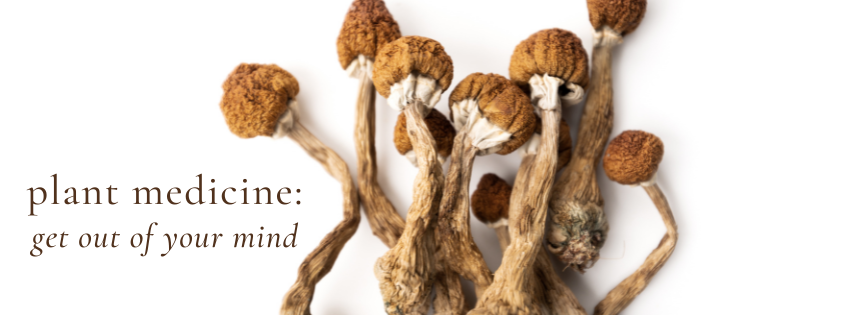Plant Medicine: Get Out of your Mind
We were raised to believe that alternatives to traditional (Western) ways of thinking were harmful or bad. Many of us grew up with the awareness that our “troublesome” behaviors were a result of something we were doing wrong. Western doctors used medications in an attempt to reduce or alleviate our symptoms. It’s just that some of us didn’t find complete relief through those protocols. In fact, we were left feeling worse off because of the shame and guilt associated with seeking out plant medicine therapies like psilocybin or cannabis.
It took me a while to accept that what I need to become healthy and whole comes from the earth – in addition to Western medicine.
This time is one of the most critical in medical history. The neuroscience of plant medicine and its effects on the brain correlate with what Eastern medicine has been teaching for centuries. We know that psilocybin (mushrooms) feed off dead neural endings in the brain and subsequently help the two sides integrate more efficiently.
Our ego gets louder and chattier the more frayed our neural endings are. That’s why plant medicine is an essential part of my own mental health and well-being. I take an integrated approach using both Western and Eastern medications. The immediate effects of prescribed Selective Serotonin Reuptake Inhibitors (SSRI) are undeniably useful, but they don’t heal the brain. By blocking the neural receptors, SSRIs quiet our symptoms by keeping serotonin in the brain. Plant medicine, however, repairs the neural pathways while also quieting the ego.
When I incorporate plant medicine as a mental health tool, I feel like I become my best self – whole and healthy. Having spent much of my life feeling the stigma of medicating with plants, I finally gave myself permission to explore the healing power of plant medicine. I discovered the information I had been given previously was steeped in myth and fear. I learned for myself that the downsides of using plant medicine were much more favorable than the consequences of drinking alcohol, for instance. I let go of the notion ingrained in me that it was bad. I gave myself permission to feel the joy of a brain that was functioning at its best – healed and whole.
Recently it became legal in the State of Colorado to possess and use psilocybin as a form of plant medicine. Naturally, my clients have many questions about using this therapy for their own mental health. I wanted to address the more common things people are wondering about so as to alleviate the stigma around using plant medicine as a mental health tool. Read the most frequently asked questions about psilocybin:
What is the difference between micro-dosing and tripping?
The biggest misconception about psilocybin is that it is intense and “trippy”. I have experienced it as being more benign than cannabis. I have never found psilocybin to be “fun” – not recreational but medicinal. Plant medicine can help release stuck trauma and treatment-resistant conditions such as PTSD and other chemical addictions, for example.
Each individual experience depends on outside factors such as who you are as an individual, the time of day, your environment, and the type and quantity of water and food you have consumed before psilocybin.
Whether or not you have a psychedelic experience described as “tripping” can also depend on the dosage you choose:
- Micro-dosing is a common form of plant medicine therapy. Consuming .1-.3 g of psilocybin is not intoxicating, nor does it impair; in fact, it could make you more calm, happier, tingle, and quiet the thoughts in your brain. Psilocybin is like nature’s Xanax
- Mid-dosing = (.4-1.5g)
- Macro-dosing = 1.5g+ full trip which may include visual hallucinations, ego dissolution or out of body sensation, mystical sense of oneness
What is the main benefit of psilocybin?
Psilocybin both literally and figuratively helps you to get out of your head. When you have treatment resistant trauma, this helps to release it. A major benefit to psilocybin is it helps you get unstuck.
How long does psilocybin last?
Although each experience is individual, the effects of psilocybin might start around 20-40 minutes after ingesting it, and last around six hours.
How do I ingest psilocybin?
There are several options for ingesting psilocybin: Mushrooms can be eaten whole, encapsulated, or brewed in a tea.
Should I isolate when I’m on a dose of psilocybin?
If you are curious about plant medicine, please schedule a free consultation with me to discuss what is right for you. Some people prefer to be alone, others like a guide.
Will I have a “hangover”?
It’s possible you will feel different the next day. You might feel a more quiet, calm, and possibly drowsy. Some people report having mental breakthroughs or epiphanies.
Plant medicine can help to relieve the pain of stuck emotions in ways that western medicine cannot. Naturally it can help heal parts of your brain. While there once was a stigma about the use of plant medicine as a mental health tool, now the perceived shame of making a choice outside of societal norms is beginning to shift towards acceptance.
Please contact Rachel Gordon if you have questions about Buddhist psychology and integrative, holistic techniques to address mental health issues and promote total body wellness. If you live in the Denver/ Castle Rock area and would like to learn more about what Rachel has to offer through Humble Warrior Therapy, please call (303) 688-6698 or click here to schedule.
Tags: Buddhist Psychology, Castle Rock, Mental Health, plant medicine, psilocybin therapy

